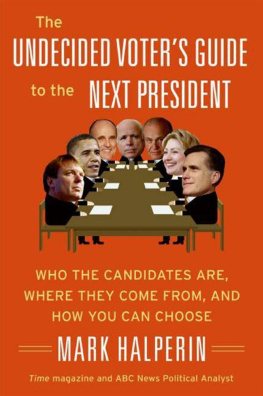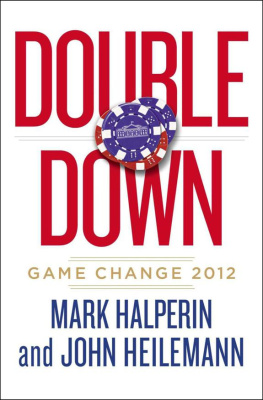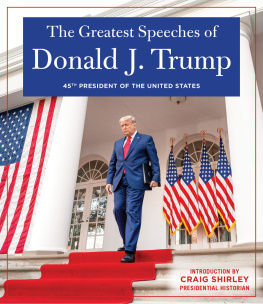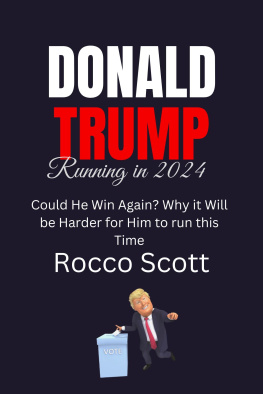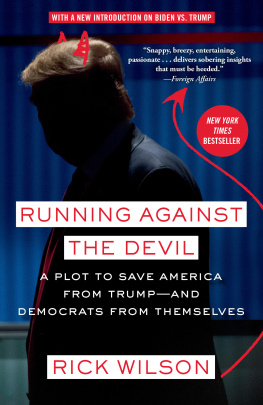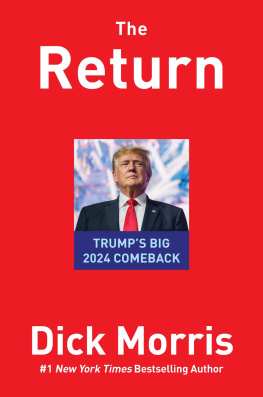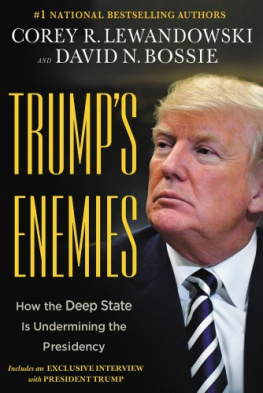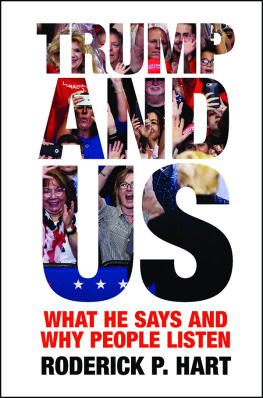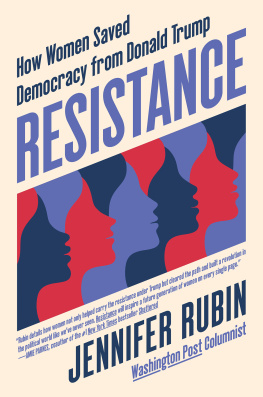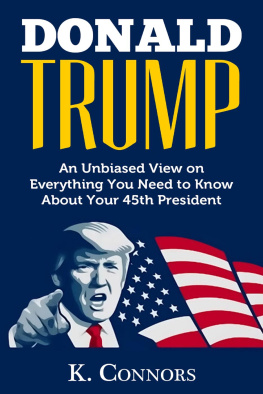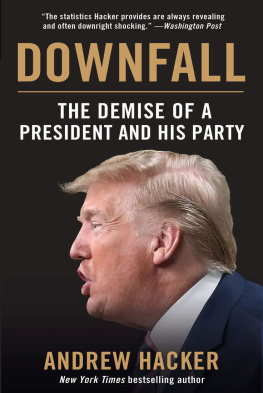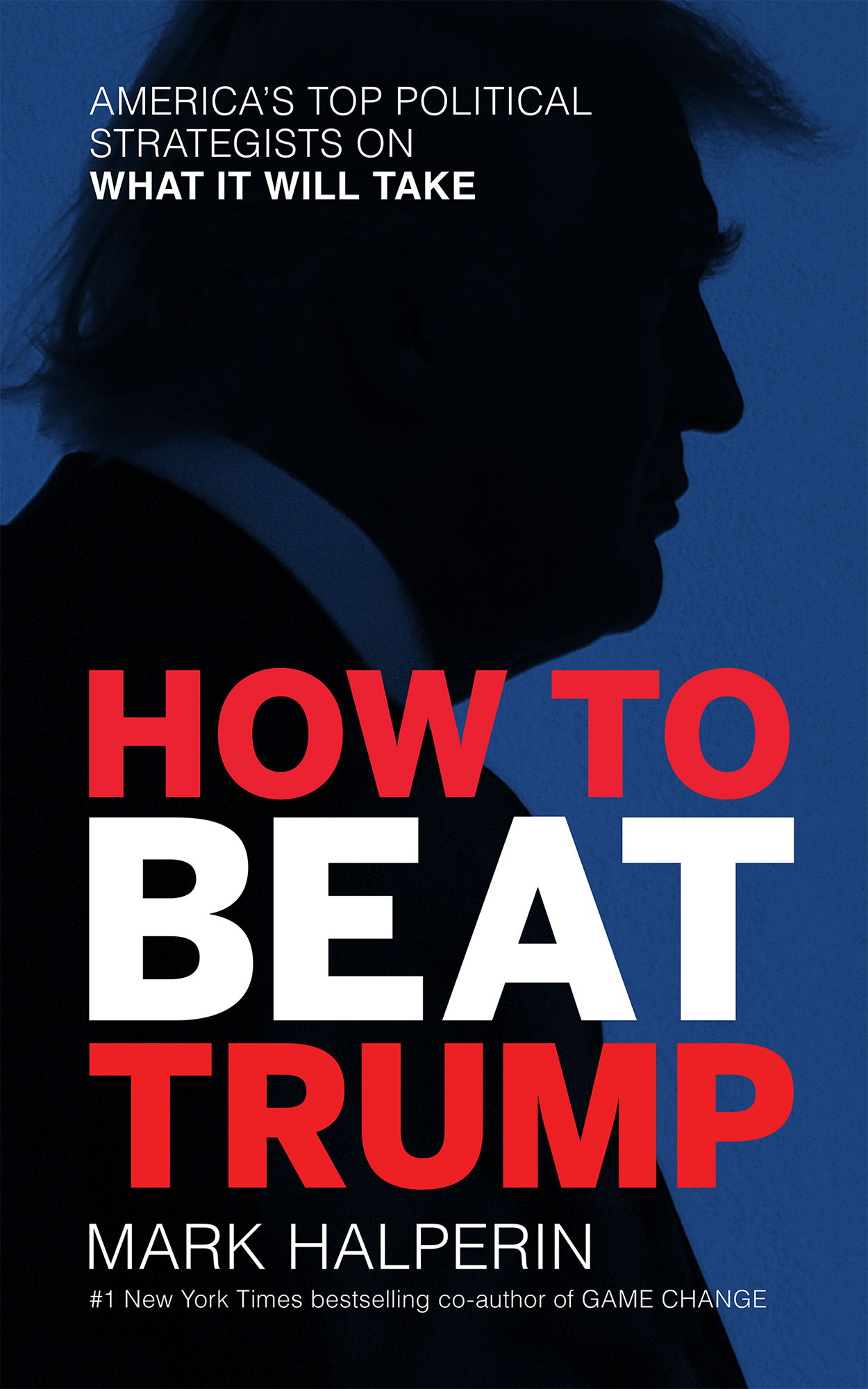Contents
Guide
ALSO BY MARK HALPERIN
Double Down: Game Change 2012 with John Heilemann
Game Change: Obama and the Clintons, McCain and Palin, and the Race of a Lifetime with John Heilemann
The Undecided Voters Guide to the Next President
The Way to Win: Taking the White House in 2008 with John F. Harris
Regan Arts.
Copyright Mark Halperin, 2019
All rights reserved, including the right to reproduce this book or portions thereof in any form whatsoever. For information, email .
First Regan Arts paperback edition, November 2019
Library of Congress Control Number: 2019948790
ISBN 978-1-68245-127-4
ISBN 978-1-68245-128-1 (ebook)
Interior design by Aubrey Khan, Neuwirth & Associates
Cover image by Xinhua / Alamy Stock Photo
For my father.
NOTHING IS SO PAINFUL TO THE HUMAN MIND AS A GREAT AND SUDDEN CHANGE.
MARY WOLLSTONECRAFT SHELLEY, FRANKENSTEIN
INTRODUCTION TRUMP CAN WIN AGAIN
L ong ago, way back in the fall of 2003, tens of millions of Americans knew three things were true about President George W. Bush:
He would lose reelection to the Democratic nominee in November 2004.
The future of the country depended on his defeat.
There would never be a worse president of the United States.
As the nation began gearing up for the 2004 presidential cycle, President Bush was looking at a tough reelection battle. His approval ratings had plummeted, and the political and personal boost he had received in the wake of the September 11, 2001, terrorist attacks had given way to a progression of bad news both at home and abroad.
Bushs economic record was abysmal. Almost three million American jobs had been lost during his tenure, family incomes had declined sharply, the number of citizens without health insurance had risen substantially, and poverty was rampant.
His foreign policy record was now defined by the human and financial costs of the war in Iraq, an unwinnable conflict Bush had begun based on a false claim that Saddam Hussein had weapons of mass destruction.
There was no peace. There was no prosperity. Republicans were distressed, despairing; Democrats were breezily confident. Bush, it was said, was doomed. James Carville, one of the keenest campaign strategists of the modern era, declared at the time that if Bush were victorious over the Democratic nominee it would be the greatest political achievement of my lifetime.
Bush won reelection, beating Senator John Kerry of Massachusetts by a slim but definitive margin. His second term was notable for sputtering domestic policies, the natural and managerial disasters of Hurricane Katrina, and the 2008 financial crisis. Although Bush departed the White House with tens of millions abhorring him, his eight years in office are now regarded with nostalgia, if not quite appreciation. He is no longer considered by those tens of millions to be the worst president in American history.
That honor is held by Donald J. Trump.
And now, with the 2020 election upon us, we are looking at a parallel dynamic from sixteen years ago, amplified by the gargantuan and garish persona of Trump, loved and loathed with unprecedented intensity. Those who admire him will cheerfully don their MAGA hats; seek out his bacchanalian rallies; ignore his misdeeds, vulgarisms, and professional controversies; and head to the polls on Election Day.
Those who detest him will agonize morning, noon, and night, from this minute until November 3, 2020, desperate to eject him from Washington. That desperation is enormous, all-encompassing. In their view, a Trump loss would signify a restoration of order, balance, decency. A Trump reelection, meanwhile, would portend the death of reason, the end of all that is good in America, and the potential downfall of human civilization.
From the moment Donald Trump was sworn into office on January 20, 2017, his inaugural address an admonitory treatise on American carnage, I have found myself in countless conversations with voters and political strategists, Democrats and Republicans alike, about Trumps chances for reelection. The consistent, abiding opinion among nearly all of them has been that Trump is the favorite to win in 2020. Some think he is a substantial favorite, no matter whom the Democrats nominate to take him on.
This lack of faith in the Democrats strategic philosophy and field, and the dearth of optimism from those who want Trump out of office, has been striking. It piqued my professional interest.
Why are so many Democrats convinced that Trump will win four more years? And do the best minds in the party have any idea how to stop him?
I have been covering American politics for over thirty years, and have had the good fortune to meet some of the smartest people in the business. I decided to ask them what they think will be required of the Democratic nominee to actually get those 270 electoral votes and send Trump packing. Over dinners, meetings, telephone discussions, email exchanges, and texts, I sought their expertise and observations, gleaned tricks
of-the-trade insights, and listened to their surefire scenarios and go-for-broke schemes. I asked them all for the unvarnished, fuss-free, straight-talking, no-nonsense, Gods-honest, real-news truth.
Few thought beating Trump would be easy. But none thought it impossible. They all had ideas galore.
Trump has some serious weaknesses. His job approval rating has always been a troublesome spot for his administration, despite plenty of good economic news, with loyalty from his core supporters providing an impenetrable floor, but with minimal approbation from the rest of the electorate. Trump has been in extreme negative territory when voters are asked if he has the personality and leadership qualities a president should have. Both public and private polling have indicated that he is weaker in many of the battleground states than he was when he bested Hillary Clinton.
He also inspires strenuous and conspicuous opposition movements. The earliest days of his term saw the launch of historically large and passionate womens marches around the country and the world. Democrats experienced sweeping victories in the 2018 midterm elections, which had more to do with antipathy toward Trump than with the cyclical nature of politics or the individual contenders themselves. Progressives are gearing up to fight with the same energy and determination now.
But despite Trumps bumpy and shambolic first years in office, there are a number of reasons why so many civilians and campaign consultants think he can be reelected, reasons beyond the political sorcery he utilized in his first run, when he demonstrated a prodigious ability to connect, bully, defy, and sway.
Historically, incumbent presidents just do not lose that often. Since 1900, only four men who won the White House have lost their bids for reelection. By November 2020, it will have been almost thirty years since the American people voted an incumbent out of office.
The press likes to talk about the possibility of loss when a sitting president is challenged because it makes for a good story. In November of 2011, the New York Times Magazine ran a cover piece headlined Is Obama Toast? declaring that Barack Obama had only a 17 percent chance of winning reelection based on various indicators that previously had been predictive.


